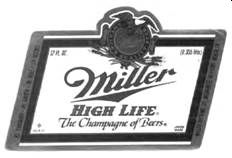- within Finance and Banking, Wealth Management, Food, Drugs, Healthcare and Life Sciences topic(s)
- with Senior Company Executives, HR and Finance and Tax Executives
- with readers working within the Accounting & Consultancy, Banking & Credit and Insurance industries
In Comité Interprofessionnel du Vin de Champagne v. Coors Brewing Company (Coors),1 the Federal Court upheld a decision of the Registrar of Trademarks (the Registrar) that maintained registrations of trademarks that the Respondent, Coors Brewing Company, had obtained as a result of a large and complex corporate acquisition.2
Specifically, the Respondent acquired ownership of three trademarks by way of assignment after Molson Coors Brewing Company purchased all of Miller Brewing International, Inc.'s assets (including the trademarks) effective as of October 13, 2016.3 The trademarks were:
- THE CHAMPAGNE OF BEERS (TMA177,553), registered in association with beer products;
- LE CHAMPAGNE DES BIÈRES (TMA319,461), registered in association with beer products; and
- MILLER LABEL & DESIGN (TMA325,567), registered in
association with brewed alcoholic beverages.4

On April 3, 2017, at the request of the Applicants (Comité Interprofessionnel du Vin de Champagne and the Institut National de l'Origine et de la Qualité), the Registrar issued notices to the Respondent pursuant to section 45 of Canada's Trademarks Act.5 Section 45 of the Act is meant to clear the trademark register of trademarks that are no longer in use.6 Accordingly, the section 45 notices required that the Respondent prove it had used the trademarks in Canada within the three years immediately preceding the date of the notices, or to provide the date the trademarks were last used and the reason for not using them since that date.7
The Federal Courtconsidered whether it was an error for the Registrar to use the acquisition date as the beginning of the non-use period, and whether the wrong test was applied to determine whether special circumstances existed that could justify non-use.8
Using the acquisition date as the beginning of the period of non-use
The assessment of whether there were special circumstances that excused the period of non-use required a determination of when the period of non-use began.
Coors submitted that Molson Canada (the Canadian licensee of the trademarks) did not have any records relating to the use of the trademarks by Miller Brewing International, Inc., prior to the acquisition. Coors also submitted that section 45 of the Act should not be interpreted to impose onerous and mandatory due diligence requirements on a purchaser to gather evidence to establish a seller's past use of their trademarks, especially in the context of a large transaction. The Registrar's analysis had noted that requiring Coors to explain why Miller Brewing International, Inc. may or may not have used the trademarks since their dates of registration (i.e., a period of several decades) would place too great an onus on the current owner.9
The jurisprudence the Registrar referenced indicated that the date of assignment or acquisition is "generally" the starting point for assessing non-use.10 The Federal Court reasoned that the use of this line of authority indicated that the Registrar did not feel automatically bound to use the acquisition date as the starting point, but rather that the Registrar referred to applicable case authorities and applied the appropriate legal tests within the factual matrix of this case to arrive at the decision.11 The Federal Court found that using the acquisition date as a starting point for assessing non-use was consistent with relevant jurisprudence and was not an error.12 The period of non-use was about six months, since the acquisition was completed in October 2016 and the section 45 notices were given in April 2017.13
Special circumstances justifying non-use
The Federal Court also found that the Registrar did not err in finding that special circumstances existed to justify the Respondent's non-use of the trademarks.14 The Registrar had noted that even though assignment or change in title would not alone demonstrate special circumstances, the size of this particular acquisition was one "not found in most cases of absence of use."15 The Federal Court found that the Respondent needed time to deal with the large and complex acquisition (valued at approximately CA$12 billion), and it required the approval of several provincial regulators before it could begin to use the trademarks. In order to obtain such approval, certain preparatory steps were needed, including the design of appropriate labels that met Canadian requirements. While Molson Canada filed the regulatory applications after the relevant period for the purposes of assessing non-use, its preparatory work (including the development of product packaging) had commenced before the section 45 notices were issued. The Québec regulator required the submission of finished product packaging with Canadian specific labelling, and product packaging and labels were also submitted to the Ontario and British Columbia regulators.16 These special circumstances both explained and were the reason for the absence of use.17
Key takeaways
The key takeaways from the Coors decision are:
- Generally, the absence of use of a trademark is penalized by expungement from the trademark register.
- However, analysis under section 45 of the Act is factually driven and case specific.
- The absence of use of a trademark can be justified by special circumstances, i.e., circumstances not found in most cases of absence of use of a trademark, provided that these special circumstances are circumstances to which the absence of use is due.
- There may be circumstances that justify using the date of assignment or acquisition of the trademark as the starting point for a period of non-use.
- The size and complexity of a corporate acquisition may influence a determination as to the existence of special circumstances, especially when combined with factors outside of the trademark owner's control, such as regulatory requirements.
Footnotes
1. 2024 FC 169 [Coors].
2. Ibid at para 1.
3. Ibid at para 8.
4. Ibid at para 7.
5. RSC 1985, c T-13 [the Act].
6. Coors, supra note 1 at para 22.
7. Ibid at para 3.
8. Ibid at para 12.
9. Ibid at para 56.
10. Ibid at para 61.
11. Ibid at paras 52, 58–61.
12. Ibid at paras 62, 65, 70.
13. Ibid at paras 8–9, 54.
14. Ibid at para 107.
15. Ibid at para 86.
16. Ibid at para 89.
17. Ibid at para 107.
About Dentons
Dentons is the world's first polycentric global law firm. A top 20 firm on the Acritas 2015 Global Elite Brand Index, the Firm is committed to challenging the status quo in delivering consistent and uncompromising quality and value in new and inventive ways. Driven to provide clients a competitive edge, and connected to the communities where its clients want to do business, Dentons knows that understanding local cultures is crucial to successfully completing a deal, resolving a dispute or solving a business challenge. Now the world's largest law firm, Dentons' global team builds agile, tailored solutions to meet the local, national and global needs of private and public clients of any size in more than 125 locations serving 50-plus countries. www.dentons.com
The content of this article is intended to provide a general guide to the subject matter. Specialist advice should be sought about your specific circumstances. Specific Questions relating to this article should be addressed directly to the author.


